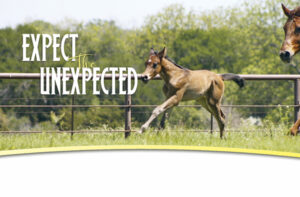Expect The Unexpected
Click here to read the complete article
124 – January/February, 2023
The anticipation grows with each day that gets crossed off the calendar. For months, mare owners have researched bloodlines, plotted a course, and then bred their mare in hopes of producing a dream maker. As days get closer, a breeder’s heart swells with the pride that will soon be a wobbly-legged “trophy” for the time, sweat, and money spent on the pairing of mare and stallion
Unfortunately, foaling season does not always go as planned. In fact, it doesn’t take long for that sense of excitement to turn to dread and fear when something just doesn’t look quite right.
Prepare for the Unknown
Is it possible to plan for every possible scenario of a breeding? Probably not, but it’s still important to try to plan for everything.
Joan Schroeder has been breeding since 1980. She has bred notable horses sucha as Blazing Hot as well as others. In her years of breeding and foaling, she’s had many positive and negative outcomes. “Absolutely you have to plan, but sometimes the best laid plans don’t bring you the results you were looking for,” she says. “But sometimes it can help deter a disaster.”
Kim Donovan works beside her partners Shelley Donovan and Hedy Levin at BSB Quarter Horses, and she concurs about preparing for just about everything. She says to expect the worst. “You can be as prepared as you think you are, but you don’t know how prepared you really are until it happens. Things can change instantly. Each situation is different,” Donovan says.
The most important preparation you can do before foaling season is caring for the broodmare prior to her date in the breeding shed. “I prepare my mare by having her cleaned and cultured,” longtime breeder Andrea Simons of Simons Show Horses stresses. “Your mare can look perfectly ready to breed, but if she doesn’t culture clean, you reduce the odds of getting the mare in foal and carrying to term.”
Schroeder stresses the importance of making connections with other reproduction facilities, veterinarians, specialists and owners. “I think it’s every breeder’s responsibility whether you’re managing stallions or mares (to make multiple connections), because there’s no way one person can know everything,” she says. “That’s why in the human medical field there are specialists. Life is too big to be an expert at everything. It’s been my blessing that I’ve been in partnership–business-wise and by personal friendship–with some of the leading equine specialists in the world, whether it be a reproductive veterinarian or a colic specialist.”
Losing a Mare or a Foal
Click here to read the complete article
124 – January/February, 2023











